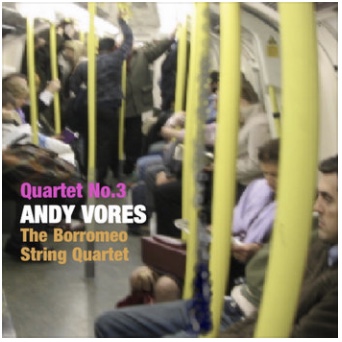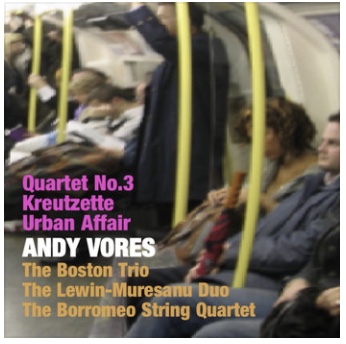
music news/events bio contact
Quartet No.3
1997
string quartet
duration 28'
commissioned by Chamber Music America
first performance:
The Borromeo String Quartet
El Paso Pro Musica / November 7, 1998
SCORE
Land
Electricity
Pansori
Mahalia
Pastorale
RECORDING
available at www//andyvores.bandcamp.com
|
PROGRAM NOTE
In 1997, when this piece was composed, the members of the Borromeo Quartet were of four different nationalities: Korean, Chinese, Italian and American. I wanted to write a work which sprang from the their cultures but without it becoming a travelogue.
There are four movements and an introduction: The introduction, Land, after a snippet of music which will later become the second movement, presents the basic material of the quartet at its most unadorned; a stream of chords accelerating and decelerating.
Electricity layers a pentatonic folk melody over insistent surging techno-inspired dance music. The two fuse and the movement ends with repeated notes speeding up, then slowing down.
Following without a break Pansori is based loosely on a Korean form of musical recitation. The cello has an almost speech-like line which is interrupted increasingly often by the other instruments playing the chords heard in the introduction. Finally the whole ensemble is caught up in a swirl of music which, at its peak, is cut off, suddenly.
Mahalia; introspective, bluesy, and restrained, is taken from the gospel song How I Got Over, in particular from versions by Mahalia Jackson and by Aretha Franklin. At the end of the movement the music climbs higher and higher as one by one the lower instruments drop out of the texture.
Pastorale thunders in, picking up at exactly the point where Pansori left off. It soon reveals itself to be a nod to the renaissance Italy of gushing fountains, hunts, and roccoco ornamentation. This movement is, in fact, a recomposed Boccherini concerto grosso, but with all the sections extremely compressed and the musical language quite changed.
REVIEW
The Vores Third Quartet is a terrific piece that brings disparate components into harmony. Each member of the Borromeo comes from a different country: Violinist Nicholas Kitchen is American (from "the country of North Carolina," he quipped); violinist Ruggero Allifranchini hails from Italy; violist Hsin-Yun Huang is Chinese; cellist Yeesun Kim is Korean. The musicians play with such unity of conception and ensemble that one hadn't really noticed how unique its configuration probably is before Vores dranatized it by paying homage to the native country of each of the musicians. Each movement is therefore in a different style, but the quartet is united by certain harmonic and rhythmic motifs, and by the zest of Vores's personality. The Taiwan movement depicts a bustling modern culture in minimalist ostinati. Lying behind it, concealed within it, is tradition, represented by pentatonic music played in the style of the Chinese erhu. Korea is represented by its native epic form, the declamatory pansori. America sings godpel music, How I Got Over, with the rhythmic and tonal inflections of Mahalia Jackson and Aretha Franklin guiding the writing for strings. Italy wins the finale, a dizzyingly condensed version of a Boccherini Concerto Grosso that sings of sun, splashing fountains, and the hunt.
Vores's work is not without precedent. Dvorak appropriated to his purposes musical cultures not his own, and today the Kronos Quartet has built its politically correct image on exploring world music, although some Kronos repertoire sounds almost like an imperialist rip-off. There’s nothing exploitative about the Vores piece, howeve; it’s celebratory, imaginative, touching, and fun.
Richard Dyer • The Boston Globe

